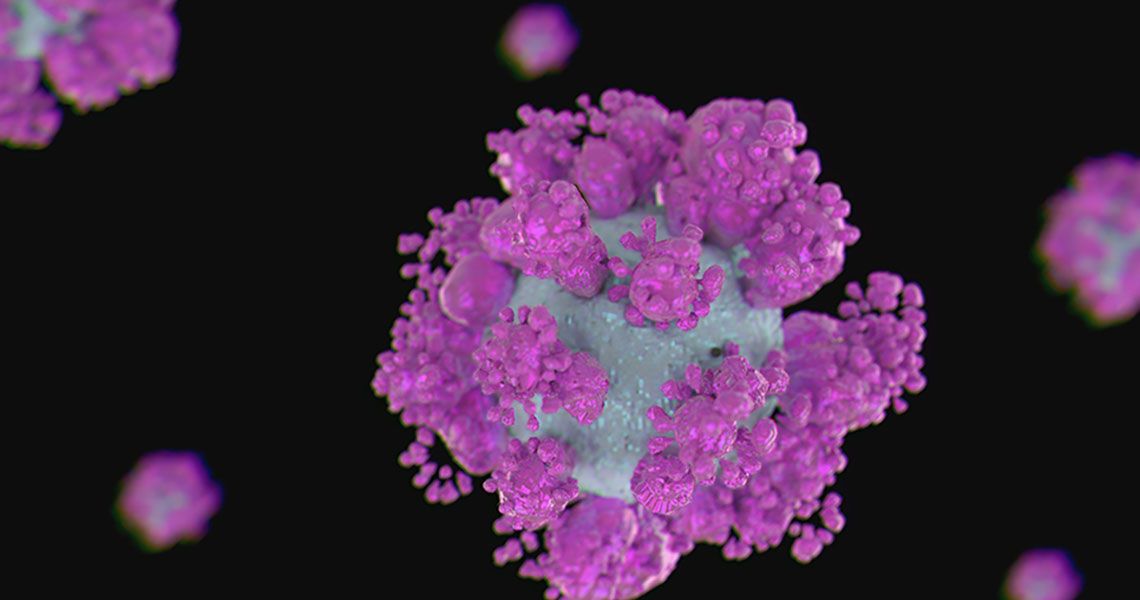
In late July 2021, the Centers for Disease Control and Prevention (CDC) released updated guidance outlining the urgent need for increased vaccination coverage due to the emergence of the Delta variant SARS-CoV-2 virus that causes COVID-19. The call for expanded vaccination was the result of a rapid increase in reported COVID-19 cases, as well as reports of “breakthrough” infections among fully vaccinated people.
A month before the new guidance was released, the CDC reported a seven-day average of 12,000 new cases. By July 27, the seven-day average had climbed to 60,000. Here, David Diemert, MD, clinical director of the GW Vaccine Research Unit and professor of medicine at the George Washington University School of Medicine and Health Sciences discusses what scientists know about the Delta variant.
Q: Cases of COVID-19 are one the rise again worldwide. What’s behind this fourth wave of infection in the United States?
Diemert: The current fourth wave is due almost entirely to the Delta variant of the virus that originated in India. It is much more transmissible than the original strain and other variants. The currently authorized (Moderna and Johnson & Johnson) and approved (Pfizer) vaccines are still very effective at preventing severe disease and death due to the Delta variant, but they appear to be less effective at stopping all infections. So-called “breakthrough” infections of the Delta variant have been reported in fully vaccinated individuals, though it should be emphasized that these are only in a small minority of those who are fully vaccinated, and the disease is mostly mild or asymptomatic. However, [vaccinated people who become infected] can still shed the virus and potentially transmit it to others. Therefore, in my opinion, the move toward reinstituting indoor mask mandates is warranted even for fully vaccinated people.
Q: How is the Delta variant different from the original strain of the virus?
Diemert: The Delta variant of the SARS-CoV-2, the virus that causes COVID-19, contains several mutations in the critical spike protein that it uses to attach to human respiratory tract cells, thus initiating the infection process. For the Delta variant, three of these mutations are in the “receptor binding domain” of the spike protein, the part that is most important for binding to human cells. These mutations appear to allow for stronger binding of the virus to the angiotensin — a protein involved in narrowing or constriction of blood vessels and an increase in blood pressure — and converting the enzyme-2 (ACE2) protein found on the surface of cells lining the human respiratory tract, thus increasing its chances of infecting the person who has breathed in the viral particles.
Q: An increasing number of those infected with the Delta variant have already been vaccinated. Why is that?
Diemert: In addition to increasing binding between the spike protein and ACE2 on human cells, the Delta variant mutations also seem to reduce the binding of antibodies that have been induced by the currently authorized or approved COVID-19 vaccines. Therefore, the vaccine-induced antibodies may not prevent infection as well with the Delta variant compared to other variants and the original virus strain.
Q: How severe is the Delta variant among unvaccinated versus vaccinated people?
Diemert: Thankfully, the emerging data indicate that among vaccinated people, the Delta variant causes mostly mild to moderate symptoms. Severe disease or death from the Delta variant is rare in fully vaccinated people. However, among unvaccinated people, the Delta variant appears to be more virulent, and some studies suggest that it causes more severe disease than the previous variants.
Q: Can we expect more variants to emerge, and are they popping up because of the large numbers of unvaccinated people?
Diemert: As long as there is continued viral transmission, there is the possibility that more variants could emerge. The more new infections there are, the more opportunities the virus has to mutate. The large number of unvaccinated people has definitely increased the likelihood of variants emerging since they can serve as incubators for the emergence of new strains of the virus.
Q: When will boosters be available, and who should get one?
Diemert: The CDC recently announced it is developing a plan to offer booster shots this fall subject to a U.S. Food and Drug Administration (FDA) evaluation and determination of the safety and effectiveness of a third dose of the Pfizer and Moderna mRNA vaccines. Earlier in the month, the FDA authorized giving an additional dose of the Pfizer and Moderna vaccines boosters for special populations, such as those who have received an organ transplant or are significantly immunosuppressed. Studies have shown that these individuals have a lower likelihood of responding to the usual primary vaccination series (i.e., two injections for Pfizer and Moderna, one for Johnson & Johnson).
Q: Can people who had the Johnson & Johnson vaccine get the Moderna or Pfizer vaccines as a booster? Or vice versa?
Diemert: There is no recommendation to get the Moderna or Pfizer vaccines as a booster if someone originally received the Johnson & Johnson vaccine, or vice versa. The regulations regarding Emergency Use Authorization require that health care providers only provide the authorized vaccines according to the instructions from the FDA, and the current instructions do not allow for such attempts at boosting. However, there are several clinical trials underway to assess different boosting and mix-and-match vaccination strategies, so there are opportunities for people to get an additional vaccine dose in a controlled research setting, including here at GW.



